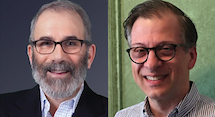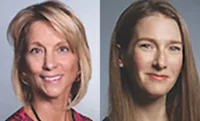 Gil Bashe and John Bianchi co-authored this article. Gil Bashe and John Bianchi co-authored this article. |
In a crisis, people hunger for direction. For the past two-plus years, they've gone hungry. COVID-19 is slowly becoming endemic, and now, though we all want to get "back to normal," it's doubtful that the way things used to be will come back into view anytime soon. Too much has changed, and one of those changes has been to the existence of objective truth.
Since early 2020, we've grappled with two pandemics: COVID-19 and poor communication. The public's confidence in elected officials and scientists has been shaken as conflicting messages, many delivered by those with the biggest social media megaphones, made it more challenging to fight this virus.
Even now, during what we all hope is the end of the pandemic, the chorus of talking heads spouting conflicting messages and half-truths continues to confuse millions rather than shed light.
The flood of misperceptions and misinformation—driven by political agenda, arrogant individualists, and a disinformation campaign about vaccine safety, risks and side effects—is unfortunately here to stay. Those bending the facts to suit their personal and political agendas have benefitted from and are themselves the creation of social media, which doesn't exist to convey facts but rather opinions.
| This article is featured in O'Dwyer's May '22 PR Firm Rankings Magazine (view PDF version) |
We've learned much about the truth in this era of social-media-fueled "neo-tribalism." We discovered what happens when science is sliced and diced by political perspective. We now know what happens when sports stars self-appoint as medical experts. We learned that truth per se doesn't matter to many people; what matters to them is following those in authority who parrot back pronouncements that match their already deeply held personal beliefs. What will happen due to Elon Musk's takeover of Twitter is unknown, but from what we know so far, we can't expect that platform to restore objectivity to the truth.
Scientists, government public health experts, pharma leaders and communicators continue to face an uphill climb in getting the facts across. Science may yet regain society's reverence and trust despite the damage sustained.
Scientists and those who communicate on their behalf must first face the reality that they've lost command of the podium. To regain their authority, they must learn to work the platforms and personalities that consumers use to digest information. Scientists are recognized experts in assessing clinical and epidemiological data, but their doctorates and academic positions no longer hold sufficient weight to place them in the sole role of convenors for societal action.
While re-establishing respect and reverence for the truth is beyond anyone's ability at this moment, we can help to reestablish belief in science. The path forward is complex, but it's achievable.
Recognize you can't deliver the message alone. Dr. Fauci is that rare commodity: a plain-speaking scientist who scored well with the public in this era of bluster and bluff. But even Dr. Fauci didn't connect with every community and demographic. To reach communities that are skeptical or even downright hostile to the facts in their messages, scientists need allies within those communities.
Working with sports figures, musicians, leaders in different fields and pursuits, the clergy and members of the military or police, scientists can reach the communities around these figures who trust them and connect with them on a more visceral and personal level. These "new messengers" have been very willing to go to bat for science.
Facts don't win arguments—people must be invited to accept them. Imparting facts is different from communicating. A speaker needs to be adept at argument and persuasion to be a great communicator. A great communicator can take a set of facts and use them to rally support among those inclined to believe her and win unexpected allies among those initially inclined to doubt her. Being a great communicator may not be your strength as a scientist, but one of your strengths is marshaling facts that support a great communicator's arguments.
In this new communication era—often driven by soundbites or memorable social posts—scientists have a critical job in supplying the facts and data that provide proof points for communicator teammates who will run with them and take them over the goal line.
Use the platforms that your audiences use. When public health officials and scientists talked to the public before COVID-19, they used traditional media and public service ad campaigns. That's no longer sufficient; to reach people, you have to go where they are, whether it's Twitter, Instagram or Reddit. Public health officers, epidemiologists and infectious disease experts need to recognize that only a fraction of the people they need to reach watch television or listen to the radio and can't be expected to look for their messages, however necessary. Diversify media choices to account for the fragmentation of the media landscape and audience. To reach grandma, go to a local newspaper. To reach her grandson, what's a newspaper? TikTok may be where you need to be.
Science has always mattered. Now, it matters more than ever. And yet, we have seen the voice of science drowned out by ever-more vocal and outrageous—and entertaining—speakers with agendas whose goals are to reach their devoted followers while overwhelming social media and the airwaves.
Scientists can regain societal trust; however, they must learn to work the platforms consumers use to source information, partner with new spokespeople and voices and recognize that now it's how you present the facts, not the facts you present, that win over hearts and minds. In a fast-moving crisis, when knowledge evolves, scientists must recognize that they need to hone their communication skills and be savvy in securing public trust.
While this will force many in science to step outside their comfort zone, it can and must happen. Scientists are known for creating miracles, and communications are part of the cure.
***
Gil Bashe is Chair, Global Health and Purpose at FINN Partners. John Bianchi is Vice President, Health at FINN Partners.


 Lo Isidro, senior director at Real Chemistry with more than a decade of strategic communications and PA experience, has joined Narrative Strategies.
Lo Isidro, senior director at Real Chemistry with more than a decade of strategic communications and PA experience, has joined Narrative Strategies. Nelson Fernandez, former North American chair of APCO Worldwide and managing director of Burson-Marsteller, has joined Volunteers in Medicine Berkshires as director of communications and PA.
Nelson Fernandez, former North American chair of APCO Worldwide and managing director of Burson-Marsteller, has joined Volunteers in Medicine Berkshires as director of communications and PA. Lilit Bargar, who was most recently an EVP in the healthcare practice at Weber Shandwick, comes on board at GCI Health as EVP, corporate practice lead.
Lilit Bargar, who was most recently an EVP in the healthcare practice at Weber Shandwick, comes on board at GCI Health as EVP, corporate practice lead.
 Five ways that successful thought leaders are made.
Five ways that successful thought leaders are made.


 Have a comment? Send it to
Have a comment? Send it to 
No comments have been submitted for this story yet.